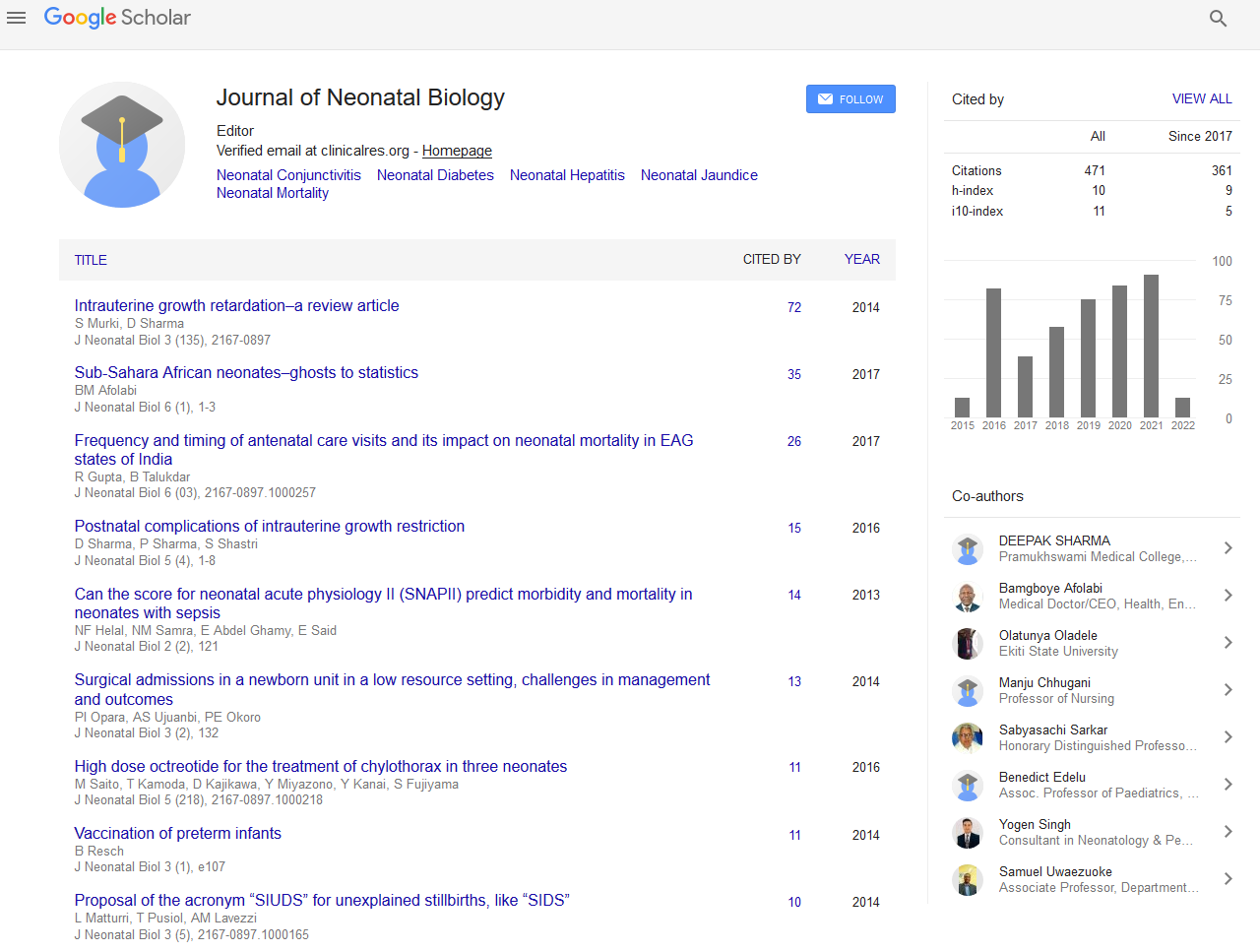PMC/PubMed Indexed Articles
Indexed In
- Genamics JournalSeek
- RefSeek
- Hamdard University
- EBSCO A-Z
- OCLC- WorldCat
- Publons
- Geneva Foundation for Medical Education and Research
- Euro Pub
- Google Scholar
Useful Links
Share This Page
Journal Flyer

Open Access Journals
- Agri and Aquaculture
- Biochemistry
- Bioinformatics & Systems Biology
- Business & Management
- Chemistry
- Clinical Sciences
- Engineering
- Food & Nutrition
- General Science
- Genetics & Molecular Biology
- Immunology & Microbiology
- Medical Sciences
- Neuroscience & Psychology
- Nursing & Health Care
- Pharmaceutical Sciences
Clinical characteristics and epidemiology of sepsis in the neonatal intensive care unit in the era of multidrug resistant organisms: A retrospective review
9th International Conference on Neonatology and Pediatric Neurology
November 28-30, 2016 Valencia, Spain
Dawood Yusef, Tala Shalakhti, Samah Awad, Hanaa Gharaybeh and Wasim Khasawneh
Jordan University of Science and Technology, Jordan
Posters & Accepted Abstracts: J Neonatal Biol
Abstract:
Sepsis in the neonatal intensive care unit (NICU) remains one of the most significant causes of morbidity and mortality. Multidrug resistant organisms (MDRO) are emerging as important pathogens causing neonatal sepsis in the NICU. Episodes of blood culture-proven sepsis for patients (0 to 90 days) in the NICU at our institution from Jan 2012 through Dec 2015 were retrospectively reviewed. 68 episodes of sepsis (ages 0-54 d, median 7 d; 34 female; 81% premature) were caused by gram-negative bacteria (n=42; 62%), gram-positive bacteria (n=21; 31%), or Candida species (n=5; 7%). The most common organisms isolated were Acinetobacter baumannii (27%), Klebsiella pneumoniae (22%), coagulase-negative Staphylococcus (CoNS) (18%), group B Streptococcus (10%) and E. coli (6%). Compared to non-MDRO cases (n=15; 29%, excluding CoNS and Candida), MDRO (n=36; 71%) were associated with higher mortality (58% vs. 13%, p=0.005) and more delay in providing targeted antimicrobial therapy (61% vs. 13%, p=0.004). Sepsis due to the most resistant organisms (A. baumannii and K. pneumoniae Carbapenemase (KPC)-producing bacteria, n=20; 39%) was associated with higher mortality, higher rates of leukopenia and thrombocytopenia (p=0.001, 0.02, 0.04; respectively), and significantly associated with exposure to a carbapenem and vancomycin before onset of sepsis (cases exposed=16/20; 80%, p<0.001, median days of exposure=10 (3-17)). MDRO are the most common causative pathogens of sepsis at our NICU, and are associated with higher mortality compared to non-MDRO. Previous exposure to a carbapenem and vancomycin was associated with sepsis caused by the most resistant organisms.
Biography :
Email: dawood_hh@hotmail.com


